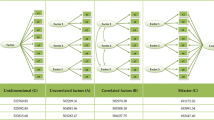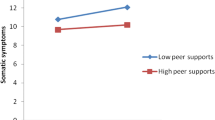Summary
Two samples of first year medical students were studied, one in Houston, Texas, the other in Edinburgh, Scotland. Personality, measured on entry, and social support, measured prior to first year examinations, were used to predict scores at the latter time on anxiety self-ratings, depression self-ratings and the General Health Questionnaire. At both centres social support was implicated in symptomatology, but many significant effects were centre specific. Presence of a local friend in whom to confde was important in Houston, while support from a relative and superficial support from classmates were salient in Edinburgh. In general, presence of support was associated with lower symptoms, but there were important exceptions similar in both centres. Students who didnot have a boy/girl friend during the study period wereless anxious than the rest. Regarding personality, students high on suspiciousness weremore anxious and depressed when they hadhigh levels of support. Among reserved (aloof and introspective) students both gain and loss of a boy/girl friend during the year were strongly associated with depressed mood. It is concluded that, particularly for students high in suspiciousness, reserve and shyness, the costs of social relationships sometimes outweigh the benefits.
Similar content being viewed by others
References
Billings AG, Moos RH (1981) The role of coping responses and social resources in attenuating the stress of life events. J Behav Med 4: 139–157
Brown GW, Adler Z, Bifulco A (1988) Life events, difficulties and recovery from chronic depression. Br J Psychiatry 152: 487–498
Brown GW, Andrews B, Harris TO et al (1986) Social support, self-esteem and depression. Psychol Med 16: 813–831
Brown GW, Davidson S, Harris T et al (1977) Psychiatric disorder in London and North Uist. J Soc Sci Med 11: 367–377
Brown GW, Harris TO (1978) Social origins of depression. Tavistock, London
Cohen S, Sherrod DR, Clark MS (1986) Social skills and the stress-protective role of social support. J Pers Soc Psychol 50: 963–973
Costello CG (1982) Social factors associated with depression: a retrospective community study. Psychol Med 12: 329–339
Coyne JC, Delongis A (1986) Going beyond social support: the role of social relationships in adaptation. J Consult Clin Psychol 54: 1–7
Eysenck HJ, Eysenck MW (1985) Personality and individual differences: a natural scientific approach, Plenum, New York
Fiedler FE (1967) A theory of leadership effectiveness, McGraw-Hill, New York
Fiore J, Becker J, Coppel DB (1983) Social network interactions: a buffer or a stress. Am J Community Psychol 11: 423–439
Flaherty JA, Richman JA (1986) Effects of childhood relationships on the adult's capacity to form social supports. Am J Psychiatry 143: 851–855
Foorman S, Lloyd C (1986) The relationship between social support and psychiatric symptomatology in medical students. J Nerv Ment Dis 174: 229–239
Goldberg D (1978) Manual of the general health questionnaire. National foundation for educational research, Windsor
Goldstein MB (1980) Interpersonal support and coping among first year dental students. J Dent Educ 44: 202–205
Hammen C, Ellicott A, Gitlin M et al (1989) Sociotropy/autonomy and vulnerability to specific life events in patients with unipolar depression and bipolar disorders. J Abnorm Psychol 98: 154–160
Henderson AS, Brown GW (1988) Social support: the hypothesis and the evidence. In: Henderson AS, Burrows GD (eds) Handbook of social psychiatry, Elsevier, Amsterdam New York
Henderson AS, Moran PAP (1983) Social relationships during the onset and remission of neurotic symptoms: a prospective community study. Br J Psychiatry 143: 467–472
Lorr M, Suziedelis A (1969) Modes of interpersonal behaviour. Br J Soc Clin Psychol 8: 124–132
McAdams DP, Healy S, Krause S (1984) Social motives and patterns of friendship. J Pers Soc Psychol 47: 828–838
Miller PMcC, Ingham JG (1976) Friends, confidants and symptoms. Soc Psychiatry 11: 51–58
Miller PMcC, Ingham JG (1979) Reflections on the life-events-to illness link with some preliminary findings. In: Sarason IG, Spielberger CG (eds) Stress and anxiety, vol 6, Hemisphere, Washington
Miller PMcC, Kreitman NB, Ingham JG et al (1989) Self-esteem, life stress and psychiatric disorder. J Affective Disord 17: 65–75
Miller PMcC, Surtees PG, Kreitman NB, et al. (1985) Maladaptive coping reactions to stress — a study of illness inception. J Nerv Ment Dis 173: 707–716
Miller PMcC, Ingham JG, Kreitman NB et al (1987) Life events and other factors implicated in onset and remission of psychiatric illness in women. J Affective Disord 12: 73–88
Murphy E (1982) Social of depression in old age. Br J Psychiatry 141: 135–142
Norbeck JS, Tilden VP (1983) Life stress, social support and emotional disequilibrium in complications of pregnancy: a prospective multivariate study. J Health Soc Behav 24: 30–46
O'Hara MW (1986) Social support, life events and depression during pregnancy and the puerperium. Arch Gen Psychiatry 43: 569–573
Pagel MD, Erdly WW, Becker J (1987) Social networks: we get by with (and in spite of) a little help from our friends. J Pers Soc Psychol 53: 793–804
Parker G (1979) Parental characteristics in relation to depressive disorders. Br J Psychiatry 134: 138–147
Parker G, Tupling H, Brown LB (1979a) A parental bonding instrument. Br J Med Psychol 52: 1–10
Richman J, Flaherty J (1985) Coping and depression: the relative contribution of internal and external resources during a life cycle transition. J Nerv Ment Dis 173: 590–595
Rosenberg M (1965)_The measurement of self-esteem. Society and the adolescent image. Princeton University, Press, Princeton
Sarason IG, Sarason BR, Potter EH et al (1985) Life events, social support and illness. Psychosom Med 47: 156–163
Surtees PG (1980) Social support, residual adversity and depressive outcome. Soc Psychiatry 15: 71–80
Thoits PA (1982) Conceptual, methodological and theoretical problems in studying social support as a buffer against life stress. J Health Soc Behav 23: 145–159
Tyrer P, Alexander J (1979) Classification of personality disorder. Br J Psychiatry 135: 163–167
Vitaliano PP, Maiuro RD, Russo J, Mitchell ES (1989) Medical student distress: a longitudinal study. J Nerv Ment Dis 177: 70–76
Weiss RS (1974) The provisions of social relationships. In: Rubin Z (ed) Doing unto others, Prentice Hall, Englewood Cliffs, NJ
Author information
Authors and Affiliations
Rights and permissions
About this article
Cite this article
Miller, P.M., Lloyd, C. Social support and its interactions with personality and childhood background as predictors of psychiatric symptoms in Scottish and American medical students. Soc Psychiatry Psychiatr Epidemiol 26, 171–177 (1991). https://doi.org/10.1007/BF00795210
Accepted:
Issue Date:
DOI: https://doi.org/10.1007/BF00795210




